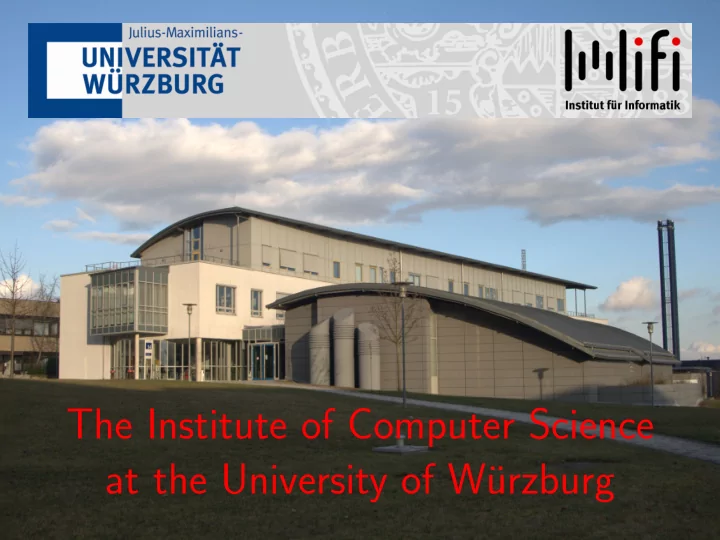

The Institute of Computer Science at the University of W¨ urzburg
The Institute in Numbers 8 chairs and 16 professors roughly 150 first-year students per year approx. 40 PhD students (at any time) Erasmus contacts to several other European universities Two Associated Research Centers: ARC – Adaptive Robotics Center IRC – Internet Research Center 3 Bachelor and 3 Master study programs
Our Bachelor and Master Study Programs Bachelor Bachelor Bachelor 3 years Computer Science Human- Space and Computer Aerospace Systems Informatics
Our Bachelor and Master Study Programs Master 2 years Master Space Human- Computer Science Master Computer Systems Bachelor Bachelor Bachelor 3 years Computer Science Human- Space and Computer Aerospace Systems Informatics
Our Bachelor and Master Study Programs Master 2 years Master Space Human- Computer Science Master Computer Systems Bachelor Bachelor Bachelor 3 years Computer Science Human- Space and Computer Aerospace Systems Informatics New B.Sc. study program (starting fall 2016):
Our Bachelor and Master Study Programs Master 2 years Master Space Human- Computer Science Master Computer Systems Bachelor Bachelor Bachelor 3 years Computer Science Human- Space and Computer Aerospace Systems Informatics New B.Sc. study program (starting fall 2016): – Games Engineering –
Chair I: Algorithms, Complexity and Knowledge-Based Systems Prof. Wolff Prof. Glaßer Prof. Seipel
Chair I: Algorithms, Complexity and Knowledge-Based Systems Visualization of Graphs Algorithms for Geographic Information Systems (GIS) Prof. Wolff Prof. Glaßer Computational Complexity Automata Theory and Formal Languages Knowledge-Based Systems Logic Programming Prof. Seipel
Chair II: Software Engineering Prof. Kounev
Chair II: Software Engineering Dependable & Efficient Software Systems Autonomic computing Quantitative System Evaluation Prof. Kounev
Chair III: Communication Networks Prof. Tran-Gia
Chair III: Communication Networks Next Generation Networks Future Internet Applications and Overlays Wireless Networks Prof. Tran-Gia
Chair V: Technical Comp. Science Prof. Kolla
Chair V: Technical Comp. Science Prof. Kolla Wireless Sensor Networks Embedded Systems Computer architecture
Chair VI: Artificial Intelligence and Applied Comp. Science Prof. Puppe Prof. Hotho
Chair VI: Artificial Intelligence and Applied Comp. Science Data Mining Information Extraction E-Learning Prof. Puppe Bibsonomy / Web 2.0 Semantic Web Ubiquitous Web Mining Prof. Hotho
Chair VII: Robotics and Telematics Prof. Schilling Prof. N¨ uchter
Chair VII: Robotics and Telematics Pico-Satellites / Space Exploration Mobile Robots Manipulators and Medical Robotics Prof. Schilling Control and Automation Technology Distributed Networked Systems GraphSLAM Prof. N¨ uchter
Chair VIII: Aerospace Information Technology Prof. Montenegro Prof. Kayal
Chair VIII: Aerospace Information Technology Dependable Computing Autonomous In-Door Flight Vehicles Real-Time Operating Systems Prof. Montenegro Small Satellites for Scientific Missions Space Systems with Higher Autonomy Space Situational Awareness Prof. Kayal
Chair IX: Human-Computer Interaction Prof. Latoschik Prof. Lugrin
Chair IX: Human-Computer Interaction Prof. Latoschik Intelligent Graphics Multimodal Interfaces Virtual, Augmented Designing for Diversity and Mixed Reality Human-Agent Interactions Virtual Characters Prof. Lugrin
Computer Science Education Prof. Hennecke
Computer Science Education Prof. Hennecke Motivating Topics for C.S. Education Robotics for C.S. Education Diagnosis of Misconceptions in Fraction Arithmetics
Third-Party Projects (ongoing) VII:Advanced Researcher Grant ERC: 2.5 M e Networked, Cooperating Pico-Satellites III: SASER-SIEGFRIED EU: 0.5 M e of 25 M e Safe and Secure European Routing – Security in Energy-Efficient Flexible and ResilIent Data Networks III: SmartenIT EU 7th Framework: 0.4 M e of total 3M e Socially-Aware Management of New Overlay Application Traffic Combined with Energy Efficiency in the Internet II: VMware Academic Research Award 0.3 M e VI: Knowledge-/Model-Based Therapy Control in Medicine BMBF: 0.2 M e of 1.5 M e I: EuroCore EuroGIGA project GraDR ESF: 0.2 M e of 2 M e Graph Drawing and Geometric Representations
Awards (2010–14) Best IMIS’12 Schatz, Hoßfeld, Casas (III) (III) Paper Networks’10 Tomaszewski, Pioro, Cezary, Hock, Hartmann, Menth IEEE P2P’10 Lehrieder, D´ an, Hoßfeld, Oechsner, Singeorzan (III) Best Student SENSORNET’13 M¨ uhlberger (V) Paper W2GIS’13 ACMGIS’13 Van Dijk (I) Van Dijk (poster) Best Presen- IBM PhD Fellowship Award Herbst (II, 2014) tation SPEC 2014 Presidential Award Kounev (II, 2014) Other Chamber of Commerce Award Gageik (VIII, 35 k e , 2014) Awards Automatica Walter Reis Award Herrmann, Schilling (VII, 2012) ISPRS Otto von Gruber Award Haunert (I, 2012) KuVS Communication Software Award Staehle, Wamser, Hirth, Stezenbach, Deschner, Staehle (III, 2011)
Welcome to W¨ urzburg! See you at the Institute of Computer Science!
Recommend
More recommend